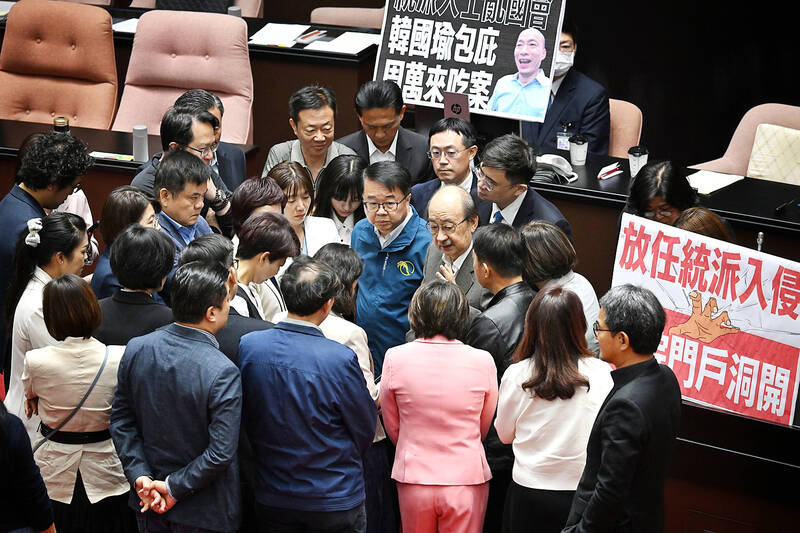The Legislative Yuan yesterday said it has revoked New Party Deputy Secretary-General You Chih-pin’s (游智彬) press pass, after he insulted lawmakers while live streaming a legislative meeting on Friday last week.
The Democratic Progressive Party (DPP) caucus on Monday convened a news conference accusing Legislative Speaker Han Kuo-yu (韓國瑜) of failing to take action against You’s disruption.
DPP caucus chief executive Rosalia Wu (吳思瑤) said the party promoted the “open legislature” policy when it had a majority in the legislature in the past, but also regulated press passes.

Photo: Chen Yi-kuan, Taipei Times
“More than 2,000 press passes were issued without proper control after Han became the legislative speaker,” she said.
Wu also criticized Legislative Yuan Secretary-General Chester Chou (周萬來) for refusing to accept a question raised by the DPP to discuss You’s disruption.
The DPP motioned a written proposal for Han to investigate the incident, but Chou “threw the proposal back at me ... and told me that he would not accept such a contentless proposal,” she said.
The legislature in a news release said that You on Friday last week entered the second floor of the legislative chamber during a meeting with a press card issued by VAPE Taiwan Inc.
As he verbally insulted several lawmakers while live streaming the meeting, contravening Article 9 of the Legislative Yuan Coverage Rules, the legislature has banned him from covering this legislative session from Monday, it said.
You’s press card was revoked in accordance with Article 7 of Guidelines Governing the Legislative Yuan’s Issuance of Press Pass, the legislature said.
VAPE Taiwan on Jan. 10 applied for press passes for this legislative session, which the legislature granted, categorizing it as an “online newspaper” that has “a public Web site containing regularly updated news coverage for readers,” it said.
The issuance of press passes used to have a maximum limit of 500 in total, but the rule has been loosened since the ninth Legislative Yuan in 2016 in line with the “open legislature” policy, it said.
The number of press cards issued during the ninth Legislative Yuan spiked to 1,707 for the fifth legislative session from 581 for the first session, the legislature said.
Given that the number has risen to 2,018 for the eighth session of the 10th Legislative Yuan, the 2,197 press cards granted for this session — the third session of the 11th Legislative Yuan — are within a reasonable range compared with previous years, it said.
VAPE Taiwan applied for 13 press passes for this session, a source who spoke on condition of anonymity said.
The 13 holders of VAPE Taiwan press cards include Taiwan People’s Party members, You and another New Party member, the source said.

Taiwan is stepping up plans to create self-sufficient supply chains for combat drones and increase foreign orders from the US to counter China’s numerical superiority, a defense official said on Saturday. Commenting on condition of anonymity, the official said the nation’s armed forces are in agreement with US Admiral Samuel Paparo’s assessment that Taiwan’s military must be prepared to turn the nation’s waters into a “hellscape” for the Chinese People’s Liberation Army (PLA). Paparo, the commander of the US Indo-Pacific Command, reiterated the concept during a Congressional hearing in Washington on Wednesday. He first coined the term in a security conference last

Prosecutors today declined to say who was questioned regarding alleged forgery on petitions to recall Democratic Progressive Party (DPP) legislators, after Chinese-language media earlier reported that members of the Chinese Nationalist Party (KMT) Youth League were brought in for questioning. The Ministry of Justice Investigation Bureau confirmed that two people had been questioned, but did not disclose any further information about the ongoing investigation. KMT Youth League members Lee Hsiao-liang (李孝亮) and Liu Szu-yin (劉思吟) — who are leading the effort to recall DPP caucus chief executive Rosalia Wu (吳思瑤) and Legislator Wu Pei-yi (吳沛憶) — both posted on Facebook saying: “I

The Ministry of Economic Affairs has fined Taobao NT$1.2 million (US$36,912) for advertisements that exceed its approved business scope, requiring the Chinese e-commerce platform to make corrections in the first half of this year or its license may be revoked. Lawmakers have called for stricter enforcement of Chinese e-commerce platforms and measures to prevent China from laundering its goods through Taiwan in response to US President Donald Trump’s heavy tariffs on China. The Legislative Yuan’s Finance Committee met today to discuss policies to prevent China from dumping goods in Taiwan, inviting government agencies to report. Democratic Progressive Party Legislator Kuo Kuo-wen (郭國文) said

Sung Chien-liang (宋建樑), who led efforts to recall Democratic Progressive Party (DPP) Legislator Lee Kun-cheng (李坤城), was released on bail of NT$80,000 today amid outcry over his decision to wear a Nazi armband to questioning the night before. Sung arrived at the New Taipei District Prosecutors’ Office for questioning in a recall petition forgery case last night wearing a red armband bearing a swastika, carrying a copy of Adolf Hitler’s Mein Kampf and giving a Nazi salute. Sung left the building at 1:15am without the armband and covering the book with his coat. Lee said today that this is a serious